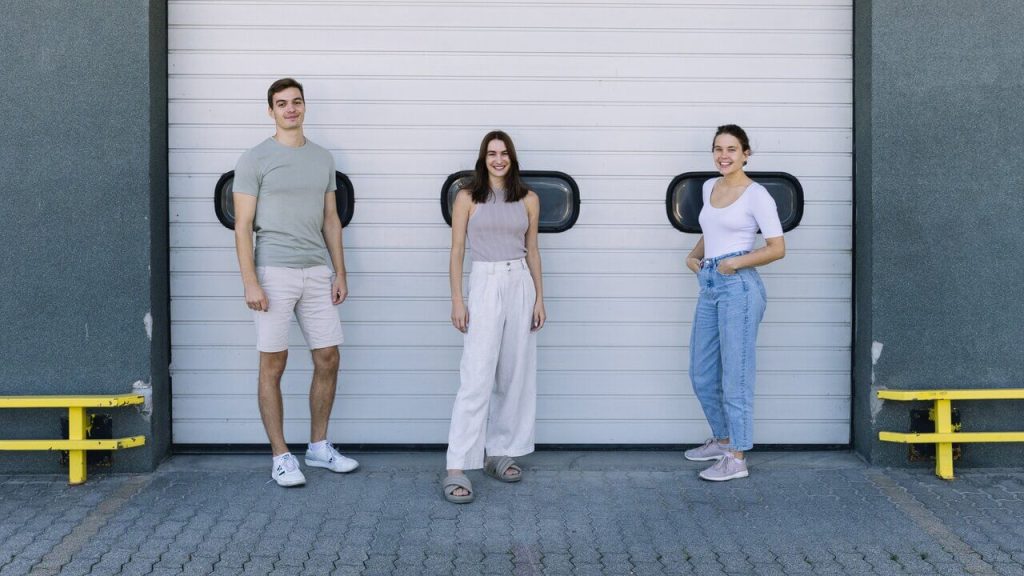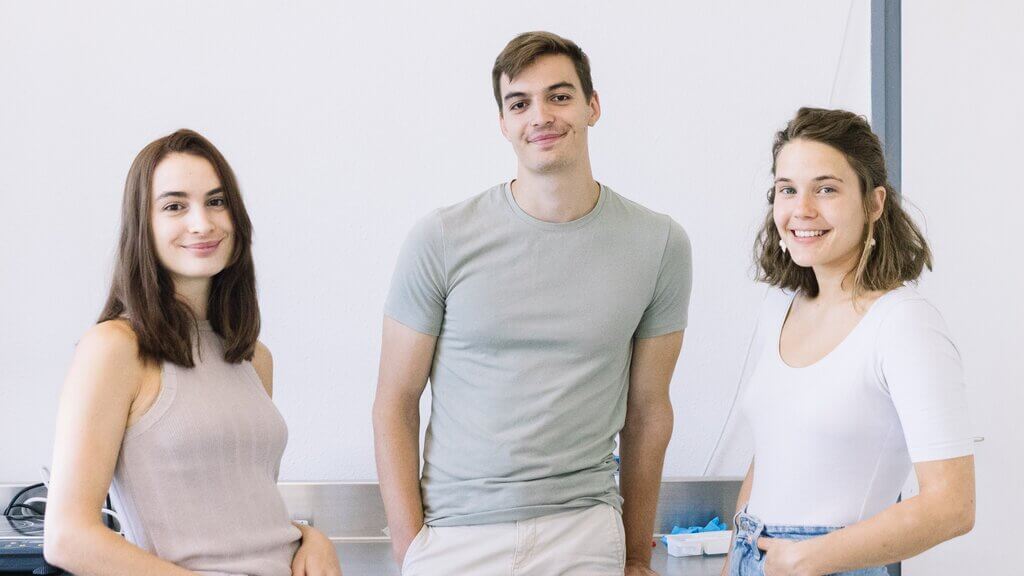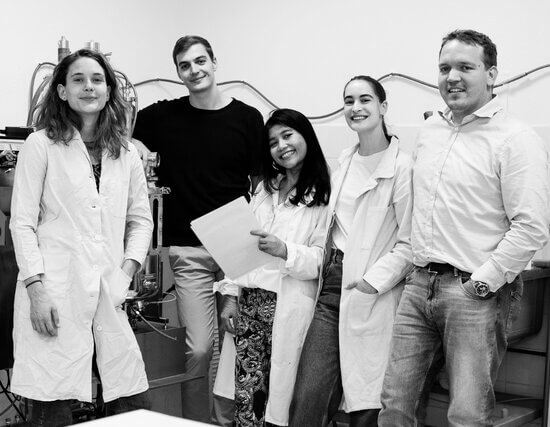pioneering sustainable fashion
CEO of Smobya and e-resident Lidia Kuti is ready to disrupt the fashion industry with her innovative bacterial cellulose leather technology

Lidia Kuti, CEO and co-founder of Smobya, has a vision to address one of the fashion industry’s most pressing challenges: its environmental impact. Based in Budapest, Hungary, Lidia’s background is in wholesale fashion sales. There, she witnessed first-hand the environmental toll of fashion production and shipping in both the fast fashion and the luxury categories.
Driven by her concerns over material waste and a desire for more sustainable alternatives, Lidia began researching ways to minimise the environmental impact of fashion. Her interest in sustainable materials is deeply rooted in her upbringing, as both her parents had biology backgrounds. They sparked her curiosity about the science behind fabric production. She worked with researchers to explore bio-materials and was inspired by pioneers such as Suzanne Lee, who was experimenting with bio-fabrication using bacteria over a decade ago.
Lidia and her two co-founders Almos Kuti and Reka Varga are now building Smobya, a biotech startup engineering cellulose to displace animal-based and plastic materials. They have an initial market focus on leather; starting with fashion and automotive upholstery applications. But they also see potential in other industries requiring plastic-free biopolymers as it provides a viable alternative to traditional materials that usually include plastics or require vast amounts of land and resources to produce.
Smobya uses bacteria to produce cellulose, which is then purified and treated so that it transforms into a lightweight, strong and sustainable leather-like material. Smobya now operates with a team of six people and is growing. The founding team of Smobya are all e-residents and the company is registered in Estonia.
From Homegrown Experiments to a Groundbreaking Startup
Lidia’s journey to founding Smobya began in the most unlikely of places—her own bathroom and kitchen. She began experimenting with cellulose-based materials at home, testing their durability and potential as alternatives to traditional leather. Initial results were positive, so she took on a challenge and entered the Mercedes-Benz Fashion Week’s Future of Fashion Competition in Budapest 2017. She had just one month to make five pieces of faux leather clothing, which she tried to grow from bacteria.
However, the sheets were far from runway-ready, and in hindsight, she “laughs at her ambitious, slightly delusional optimism”. As she dove deeper into research and material development, she began to fully understand the complexity of the challenge. Still, her belief in the material’s potential drove her to build a research team and continue the project as a side hustle while finishing her studies.
A couple of years later, she finally had her founding team in place: Reka, a material scientist, and her brother Almos, an economist. With their first funding secured from the Estonian-based Beamline Accelerator, they rented a lab, and Smobya officially came to life in May 2022.

Innovation in Sustainable Materials
Smobya’s approach is centred around the vertical system of bacterial cellulose production, which offers several advantages over traditional plant-based materials.
Unlike traditional leather, which has a heavy environmental footprint, Smobya’s materials are grown in a laboratory, reducing the need for large-scale agriculture and land use. By using bacteria to weave fine fibres of cellulose, Smobya’s faux leather is lightweight, strong, and requires far fewer resources to produce. This innovative method allows the company to stack layers of cellulose in a compact space, making production efficient and scalable.
Smobya has built a working prototype and is looking to scale production. In two years, the team has grown from 3 to 6, with a research team based in Budapest thanks to the relatively low operational costs in the region and a great pool of creative engineers. The first target markets for Smobya’s products are the fashion and automotive industries. Both have low regulatory barriers to entry and stand to benefit from the strength, flexibility, and sustainability of bacterial cellulose.
Beamline Accelerator & e-Residency: Catalysts for Growth
The corporate journey of Smobya took a major step forward after Lidia joined the Beamline Accelerator programme. Here, she was able to refine her business model and connect with valuable contacts in the industry.
Participation in Beamline also introduced Lidia and her team to Estonia’s dynamic startup ecosystem. They had already been looking around for a business jurisdiction to register Smobya. And Estonia seemed like the perfect place.
In May 2022, Lidia and her team made the strategic decision to establish Smobya as an Estonian company, taking advantage of the country’s e-Residency programme. For Lidia, e-Residency was the perfect fit for her early stage venture. She manages all operations online, making it easy and time-efficient for her busy travel schedule to meet investors and showcase product samples:
“It’s been a joy. It’s been really easy. We are so lucky to have heard about the e-Residency opportunity and be part of the ecosystem.”
Having an Estonian OÜ has enabled Lidia and her fellow e-resident co-founders to streamline bookkeeping, hire talent, and bring in funding with ease. Her setup has also helped her tap into Estonia’s innovative digital ecosystem.
Challenges, Funding, and Future Plans
As with many manufacturing startups, securing private investment has been challenging due to the high initial capital expenditure required for scaling operations. Even so, their first investment was from an angel investor - an ex-founder from Budapest who had exited from his biotech startup.
Public funding has been a lifeline for Smobya. In February 2024, the company received an applied research grant from Enterprise Estonia (EIS), which provided vital support. It has also helped attract interest from private investors and matched funding opportunities.
“The applied research grant from Enterprise Estonia helped us develop our technology a lot, and attracted more interest and matched funding. With increased research capacity, we were able to grow and make significant progress.”
Smobya is also one of the 40 recipients of the prestigious Women TechEU funding, selected from a pool of 820 applicants. This programme offers grant funding, mentorship, and networking opportunities, which will be crucial as Lidia and her team continue to scale their production capabilities.

Looking ahead, Smobya will start fundraising following the completion of their pilot system in the coming weeks. They are looking for capital to help extend their pilot system into the demo phase so they can secure offtake agreements and proceed with brand collaborations. These plans will take their fabric technology to the next level, and represent a big step towards scaling up production and fully commercialising their products by 2027.
Smobya is positioning itself for growth in this regard by considering locating their production facility in Ida-Virumaa, a region in Estonia, as well as building a pipeline of partnerships with Estonian companies to source waste products for their manufacturing process.
The Future of Smobya and e-Residency
With its innovative approach to sustainable materials and a clear plan for scaling, Smobya is poised to make a lasting impact on the fashion industry. The company’s journey, from Lidia’s home experiments to building a thriving startup, highlights the opportunities for growth in Estonia’s supportive entrepreneurial ecosystem.
For Lidia, e-Residency has been a critical part of Smobya’s success. “Managing everything online has been incredibly simple,” she says.
“Estonia’s digital infrastructure has allowed us to focus on growing our business, knowing that all the administrative tasks are taken care of seamlessly.”
As Smobya continues to grow, Lidia’s story is a perfect example of how e-Residency can empower entrepreneurs to pursue their vision, no matter the industry or location. With the backing of Estonia’s digital ecosystem and the support of international investors, Smobya’s future looks bright.
More from e-Residency
- Sign up for our newsletter
- Watch fresh video content - subscribe to our Youtube channel
- Meet our team and e-residents - register for our next Live Q&A